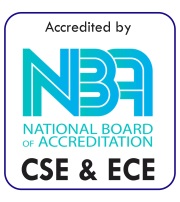ARITIFICIAL INTELLIGENCE AND DATA SCIENCE
PEO1: To demonstrate technical excellence in Artificial Intelligence and Data Science by applying their knowledge and skills to develop and implement advanced algorithms, models, and platforms for data analysis, machine learning, and deep learning.
PEO2: To acquire continuous learning and professional development to stay abreast of the latest developments in Artificial Intelligence and Data Science and related fields, and to advance their careers.
PEO3: To exhibit professionalism and leadership skills by upholding high ethical standards and contributing to the development and dissemination of best practices in Artificial Intelligence and Data Science.
Program Specific Outcomes :
PSO1: Ability to develop and implement data-driven models, algorithms, and visualization techniques using state-of-the-art tools and platforms for Artificial Intelligence and Data Science to solve real-world problems in diverse domains.
PSO2: Ability to advanced techniques such as machine learning, deep learning, and natural language processing to design and develop intelligent systems that can learn from data and adapt to changing environments.
PSO3: Collaborate effectively in interdisciplinary teams to design, develop, and deploy Artificial Intelligence and Data Science solutions that meet business, social, and scientific requirements. Conduct independent research in Artificial Intelligence and Data Science, and contribute to the development of new techniques, algorithms, and systems for the field.
Program Outcomes :
PO1 : Engineering Knowledge: Apply the knowledge of mathematics, science, engineering fundamentals and an engineering specialization to the solution of complex engineering problems
PO2 : Problem Analysis: Identify, formulate, review research literature, and analyze complex engineering problems reaching substantiated conclusions using first principles of mathematics, natural sciences and Engineering sciences.
PO3 : Design/Development of Solutions: Design solutions for complex engineering problems and design system components or processes that meet the specified needs with appropriate consideration for the public health safety, and the cultural, societal, and environmental considerations.
PO4 : Conduct Investigations of Complex Problems: Use research-based knowledge and research methods including design of experiments, analysis and interpretation of data, and synthesis of the information to provide valid conclusions.
PO5 : Modern Tool Usage: Create, select and apply appropriate techniques, resources and modern engineering and IT tools including prediction and modeling to complex engineering activities with an understanding of the limitations.
PO6 : The Engineer and Society: Apply reasoning informed by the contextual knowledge to assess societal, health, safety, legal and cultural issues and the consequent responsibilities relevant to the professional engineering practice.
PO7 : Environment and Sustainability: Understand the impact of the professional engineering solutions in societal and environmental contexts and demonstrate the knowledge of,and need for sustainable development.
PO8 : Ethics: : Apply ethical principles and commit to professional ethics and responsibilities and norms of the engineering practice.
PO9 : Individual and Team Work: Function effectively as an individual and as a member or leader in diverse teams and in multidisciplinary settings.
PO10 : Communication: Communicate effectively on complex engineering activities with the engineering community and with society at large, such as being able to comprehend and write effective reports and design documentation, make effective presentations and give and receive clear instructions.
PO11 : Project Management and Finance: Demonstrate knowledge and understanding of the engineering management principles and apply these to one's own work, as a member and leader in a team to manage projects and in multidisciplinary environments.
PO12 : Life-Long Learning: Recognize the need for and have the preparation and ability to engage in independent and lifelong learning in the broadest context of technological change.




